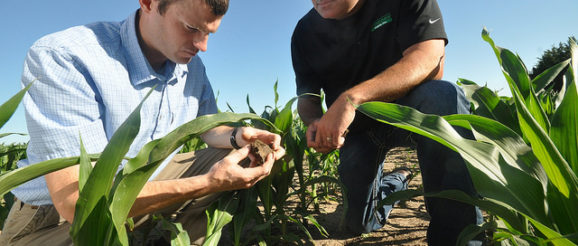New On-Farm Conservation Innovation Trials Program Awards $24 MillionNational Sustainable Agriculture Coalition

New On-Farm Conservation Innovation Trials Program Awards Over $24 Million
December 13, 2019
Conservation innovators recently received a major infusion of support from the U.S. Department of Agriculture’s (USDA) Natural Resources Conservation Service (NRCS), which last month announced over $24 million in awards for On-Farm Conservation Innovation Trials (On-Farm Trials). Sixteen projects received awards this cycle ranging from $280,000 to $3,000,000. These projects will advance innovative conservation practices across 22 states, providing support to producers testing new and creative practices.
The On-Farm Trials subprogram is a new component of the Conservation Innovation Grants (CIG) program, which is authorized by the 2018 Farm Bill. The majority of awarded projects (63 percent) in the subprogram’s first year are concentrated in NRCS’ “Central region”, although every region was awarded at least one project. Nine of the projects are part of CIG’s Soil Health Demo Trial (SHD), and the remaining seven address priorities outlined by NRCS earlier this year (precision agriculture, irrigation management, and management technologies). SHD projects received 56 percent of total funding and will benefit 16 individual states, located primarily in the Central region of the country.
In this blog post, we provide an overview of this new CIG
subprogram, and highlight notable awardees from the first round of On-Farm
Trials funding.
On-Farm Trials Overview
On-Farm Trials is a new subprogram of the larger CIG program, and CIG in turn is a subprogram of the Environmental Quality Incentives Program (EQIP), a voluntary conservation program that offers farmers and ranchers assistance to implement conservation practices. Through the CIG subprogram, NRCS offers competitive grants to fund multi-stakeholder partnerships that address a variety of natural resource concerns on agricultural lands. These on-the-ground projects help develop and transfer technology to farmers and ranchers addressing critical natural resource concerns. Projects can include on-farm pilot projects and field demonstrations.
First authorized in the 2018 Farm Bill, the On-Farm Trials subprogram supports the adoption of innovative approaches, practices, and systems on working lands. NRCS is authorized to provide $25 million per year for On-Farm Trials, with awards ranging from $250,000 to $5 million. As part of these projects, NRCS works with partners to implement and evaluate on-the-ground conservation activities. On-Farm Trials awardees use their grant funding to provide technical assistance and incentive payments to help producers offset the risk of trying novel conservation approaches on their land.
Soil Health Demo Trial (SHD)
As part of authorizing On-Farm Trials, the 2018 Farm Bill also authorized the SHD component, which focuses exclusively on conservation practices and systems that enhance soil health and increase soil carbon. Participants in SHD must use consistent soil health and soil carbon assessment protocols developed by NRCS for project evaluations.
Projects are evaluated in terms of soil health benefits, as well as by the economic outcomes generated as a result of adopting conservation practices. Through this option, farmers are supported in their efforts to build soil health, and outcomes of their trials are measured, evaluated, and reported to improve our understanding of soil health benefits. SHD projects must address one or more of NRCS’s national priorities, which include transitioning and adopting full soil health management systems, cover crop management, and increasing diversity in production systems.
Awardee Highlights
The National Sustainable Agriculture Coalition (NSAC) congratulates all of this year’s awardees on their success in a highly competitive first round. Details on a few of the many notable awarded projects follow below:
The full list of On-Farm Trials awards for fiscal year 2019 is available here.
Your email address will not be published. Required fields are marked *
